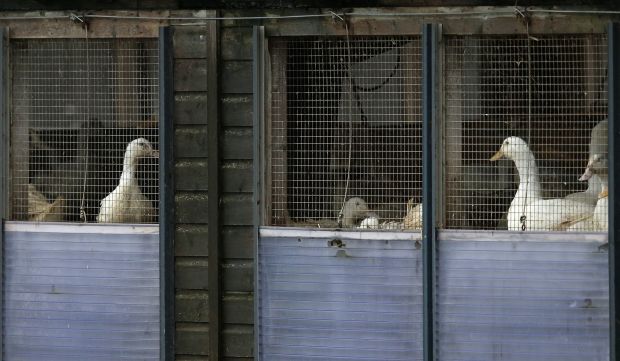
Ducks in cages are seen at a duck farm in Nafferton, northern England, in November 17, 2014. (REUTERS/Phil Noble)
British officials said they were investigating a case of the H5 bird flu virus in northern England, but noted it’s not the more dangerous H5N1 strain. They said all 6,000 ducks at a breeding farm in the Driffield area of East Yorkshire will be killed and a restriction zone was being set up to prevent further spread of the infection.
Tests were also being carried out at nearby farms.
The UK government food agency said there is no risk to the food chain and British Chief Veterinary Officer Nigel Gibbens told BBC the risk of the disease spreading is probably quite low.
It was the first bird flu outbreak in Britain in six years, officials said.
The Dutch government, meanwhile, banned the transport of poultry and eggs throughout the Netherlands after finding the H5N8 strain of bird flu at a chicken farm. All 150,000 chickens at the farm in Hekendorp, 40 miles (65 kilometers) south of Amsterdam, were being killed and 16 other nearby farms were being checked. It was not clear how the farm became infected.
Spokeswoman Catherine Bertrand-Ferrandis of the World Organization for Animal Health said that there are no known cases when the H5N8 strain was transmitted to humans.
She said Dutch authorities are taking “all the correct, normal measures” and that culling the chickens is “the only way to limit the contagion.”
On the British case, she said cases found in ducks are “usually weakly pathogenic,” as opposed to the “highly pathogenic” versions that caused panic in the past. She said there is usually “very little risk of contagion” in duck cases.
It wasn’t immediately clear if the bird flu found in Britain was the same strain found in the Netherlands.
